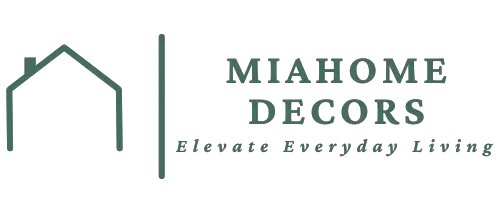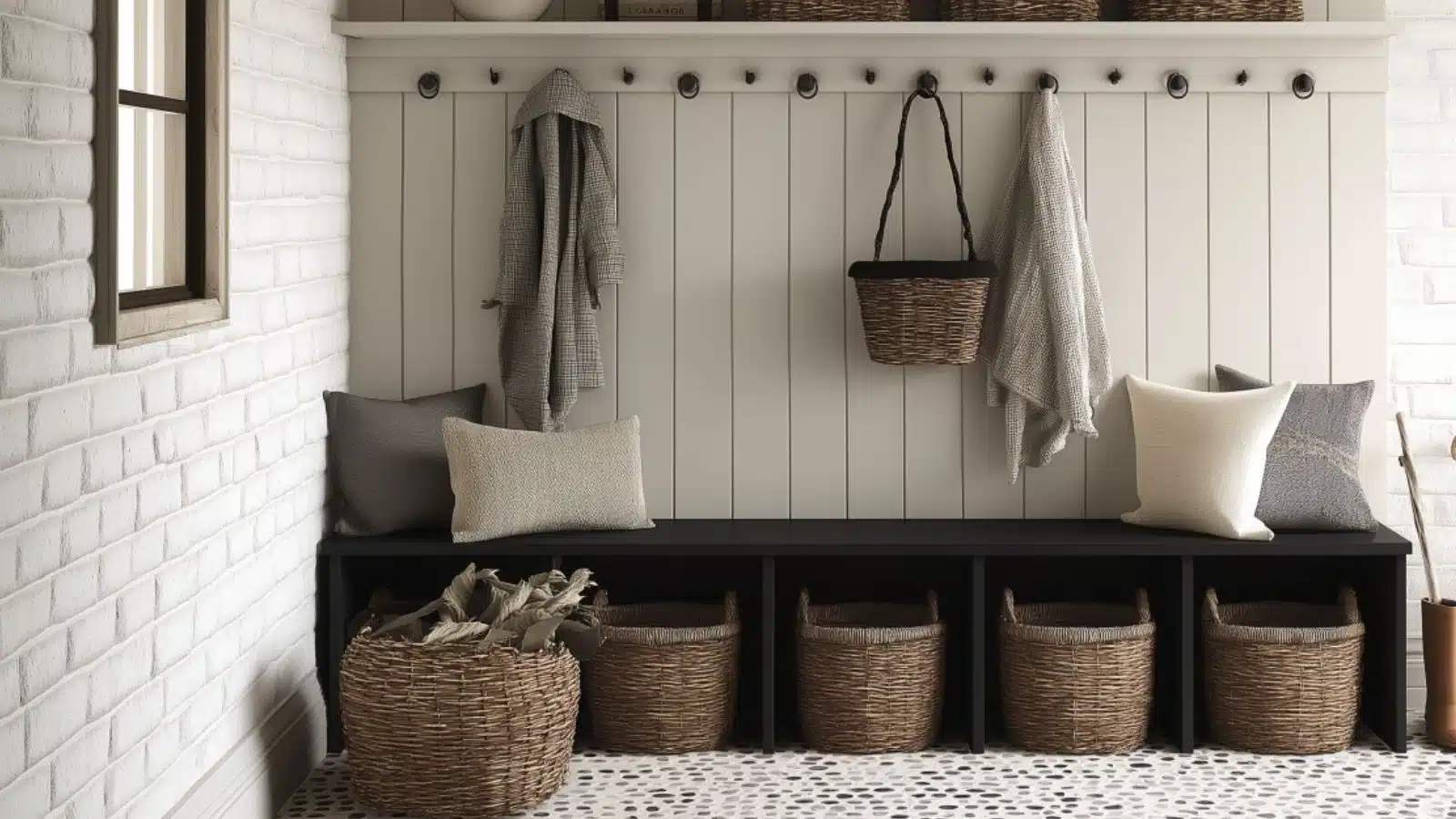Budget-Friendly Brick Flooring Options That Look Incredibly Luxe
Table of Contents
Brick flooring is no longer confined to outdoor patios and old farmhouses. It’s made a stylish comeback in interior design, offering warmth, texture, and timeless charm. But what if you could achieve this coveted look without overspending? That’s where budget-friendly brick flooring options come in—and they’re more versatile and luxurious-looking than you might think.
Today’s homeowners are increasingly turning to alternative materials and innovative installation techniques to get the rich, rustic appeal of brick without the cost and maintenance concerns. In fact, according to a recent home trends survey, nearly 40% of DIY renovators are exploring faux or modular flooring options to save money while upgrading aesthetics.
In this article, we’ll dive into the most attractive and affordable brick flooring solutions that mimic the luxury look of traditional brick. Whether you’re reimagining a mudroom, entryway, kitchen, or even a laundry space, these options deliver on both budget and style. You’ll discover various materials, learn pros and cons, and get expert tips on selecting the right one for your home.
Let’s explore how you can bring texture, depth, and elegance to your floors—without stretching your wallet.
Thin Brick Veneer: The Authentic Feel Without the Weight
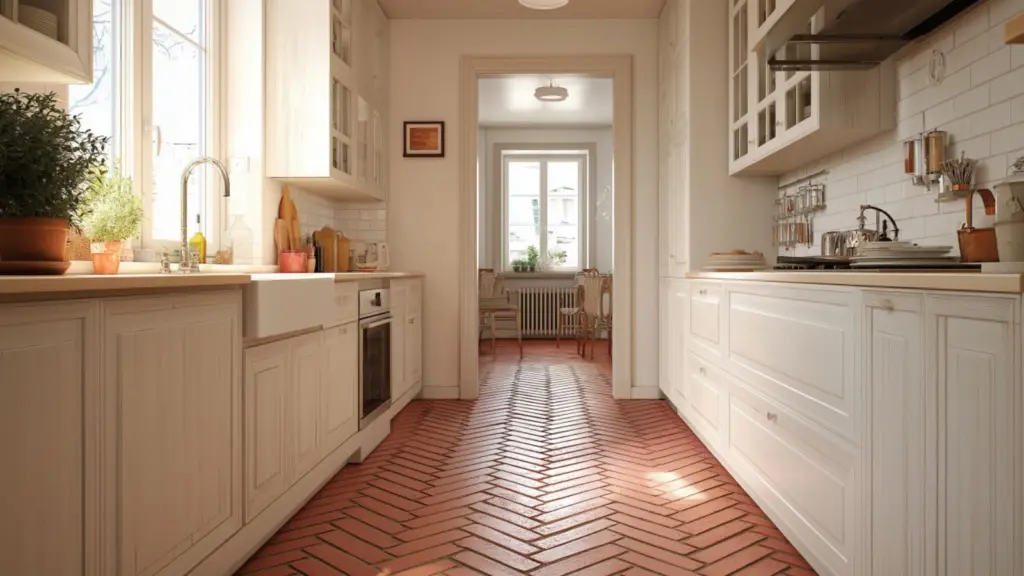
Thin brick veneer is one of the most popular ways to achieve the real-brick look at a fraction of the cost and effort. These bricks are made from the same clay as traditional bricks but are sliced thinly (usually around ½ inch thick), making them lightweight and suitable for indoor flooring.
They install much like tiles and can be laid directly over subfloors or concrete, which significantly reduces labor and material costs. Thin brick veneer offers authentic color variations and rustic textures, allowing you to bring true character into spaces like kitchens, foyers, or mudrooms.
Design-wise, this option offers flexibility. You can use traditional herringbone layouts for a European vibe or a classic running bond pattern for an industrial feel.
| Pros | Cons |
|---|---|
| Lightweight and easy to install | Requires sealing to resist stains |
| Real brick appearance | Slightly rough underfoot |
| Can be installed over subfloors | Grout lines may require maintenance |
| Available in various colors | May not suit every room style |
Brick-Look Porcelain Tile: Durable and Sophisticated
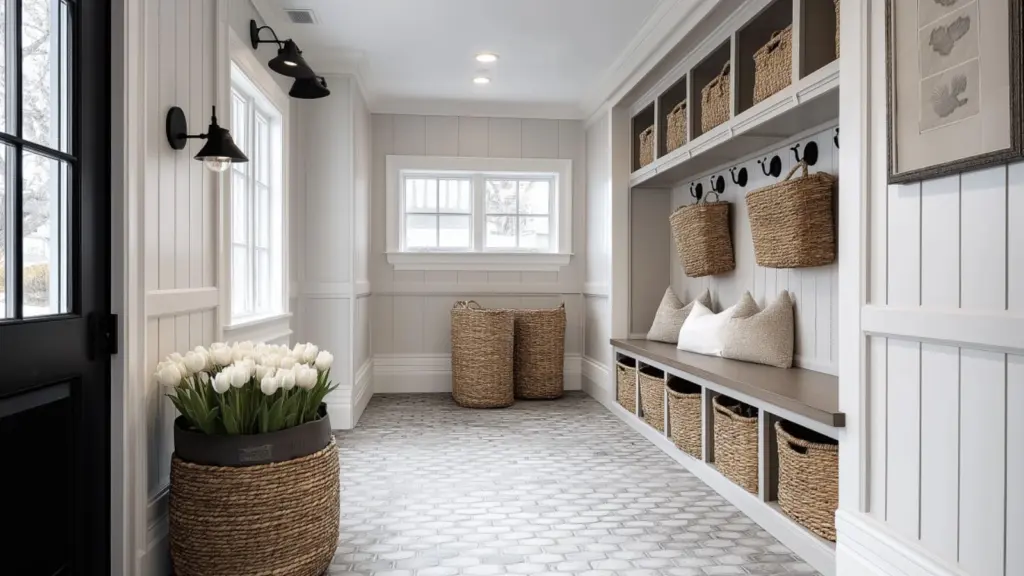
If you want the charm of brick without dealing with grout and sealing maintenance, brick-look porcelain tiles might be your best bet. These tiles are crafted to resemble brick—down to the texture and slight imperfections—yet offer the durability and water resistance of porcelain.
Perfect for areas prone to moisture like bathrooms, laundry rooms, or basements, these tiles require little upkeep and are easy to clean. Thanks to digital printing technology, you can choose from a wide range of tones—from weathered reds and browns to soft whites and grays.
This option pairs wonderfully with modern and transitional interiors, providing a clean yet character-rich aesthetic.
| Pros | Cons |
|---|---|
| Waterproof and stain-resistant | Can be cold underfoot |
| Mimics real brick convincingly | Less texture than real brick |
| Low maintenance | May require professional installation |
| Available in multiple sizes | Slightly more expensive than vinyl |
Peel-and-Stick Brick Vinyl Tiles: Stylish DIY Transformation
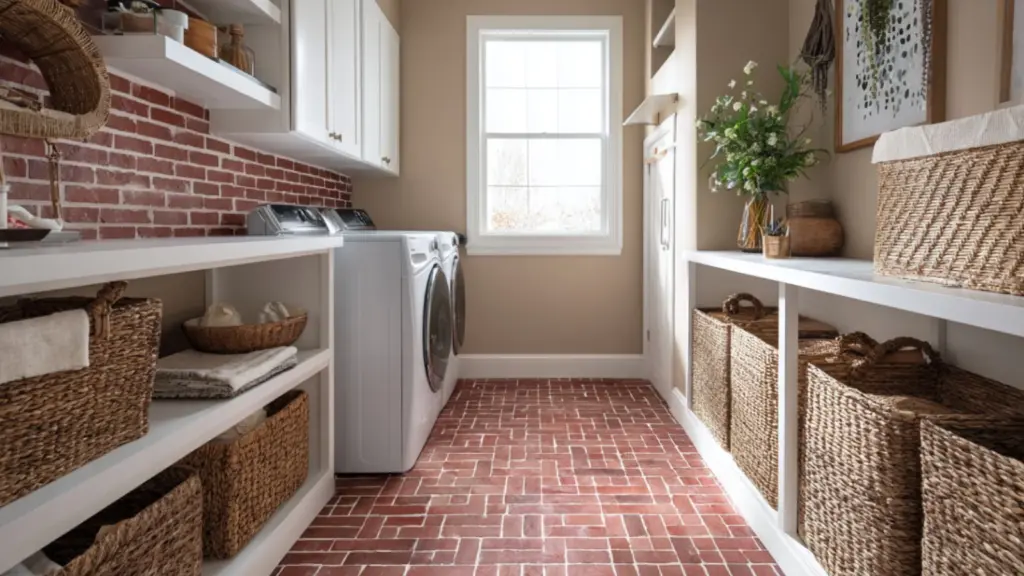
Peel-and-stick brick vinyl tiles are perfect for renters, DIYers, or budget-conscious homeowners looking for a quick transformation. These self-adhesive tiles are lightweight, flexible, and designed to mimic the look of real brick—complete with textured surfaces and printed mortar lines.
Installation is as simple as peeling the backing and sticking the tile to a clean, level floor. While these tiles aren’t suitable for high-moisture zones or heavy foot traffic, they’re great for accent areas, studio floors, or small laundry rooms where charm matters most.
You can find these tiles in a range of colors, including warm terracotta, aged gray, and whitewashed designs, offering a vintage or industrial feel without breaking the bank.
| Pros | Cons |
|---|---|
| Easy to install and remove | Not suitable for wet areas |
| Budget-friendly | May wear down faster than real tile |
| Great for renters | Adhesive may loosen over time |
| Lightweight and flexible | Limited texture depth |
Painted Concrete with Faux Brick Stencils: Customizable and Creative
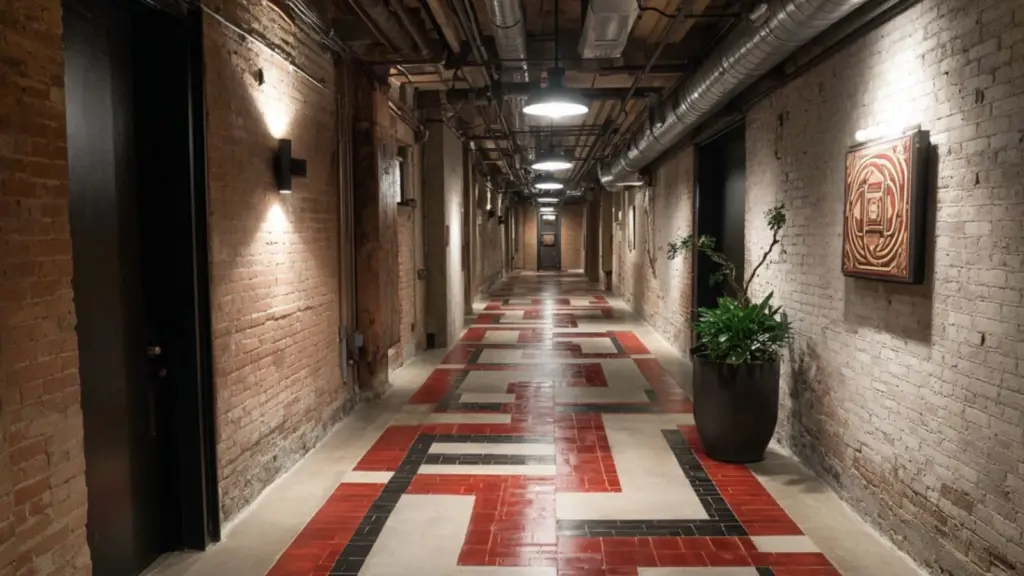
One of the most creative and cost-effective ways to simulate brick flooring is by painting concrete with brick-patterned stencils. This DIY method lets you completely control the color, pattern, and texture—making it ideal for homeowners who love a personalized touch.
Start with a clean, smooth concrete surface. Apply a base coat in a brick-like color (such as rust or terracotta), then use a stencil and sponge roller to add grout lines in contrasting shades. A top layer of polyurethane sealer ensures durability and water resistance.
What makes this option particularly appealing is its versatility. Want an old-world feel? Use muted, distressed tones. Prefer something modern? Try a crisp white-on-gray palette. This approach is not only low-cost but also fun, making it perfect for creative DIYers.
| Pros | Cons |
|---|---|
| Extremely budget-friendly | Time-consuming application |
| Fully customizable design | Needs proper sealing for durability |
| Great for concrete slabs and basements | May chip without prep work |
| Ideal for DIYers and small budgets | Not as textured as real brick |
Reclaimed Brick Pavers: Rustic Beauty with Eco Appeal
If authenticity and sustainability are top priorities, reclaimed brick pavers are a compelling option. Salvaged from historic buildings, these bricks come with unique imperfections, aged patinas, and a rich history that adds unmatched character to any space.
While the initial cost can be slightly higher than faux options, reclaimed pavers are still affordable compared to new brick or stone flooring. Their eco-friendly appeal makes them ideal for homeowners committed to sustainable living.
Installation typically requires more effort since they’re thicker and heavier than modern alternatives. However, once installed and sealed properly, they offer remarkable durability and old-world charm that’s hard to replicate.
Styling reclaimed brick floors is easy. Pair them with antique furniture, reclaimed wood shelves, or wrought iron fixtures for a rustic European farmhouse feel. For a modern twist, contrast them with sleek, minimalist finishes.
| Pros | Cons |
|---|---|
| Eco-friendly and sustainable | Heavier and thicker than alternatives |
| Offers unique, historical charm | May require subfloor reinforcement |
| Long-lasting and durable | Sealing is necessary |
| Adds resale value and authenticity | Labor-intensive installation |
Stamped Concrete That Imitates Brick Without the Hassle
Stamped concrete is a smart option for those seeking the look of brick without dealing with grout, individual tiles, or intricate installation. This flooring technique involves pressing brick-like molds into wet concrete, then coloring and sealing the surface for a finished effect.
The result is a seamless, durable floor that mimics brick while being easier to clean and maintain. It’s an excellent choice for large areas like sunrooms, patios that extend indoors, or converted garages.
You can choose from various stamp patterns and color blends to suit your interior style—from vintage red to modern whitewashed finishes. While professional installation is usually required, the long-term benefits in both cost and performance make this a worthy investment.
| Pros | Cons |
|---|---|
| Seamless and easy to clean | Typically requires professional installation |
| Customizable pattern and color | Repairs can be tricky if damaged |
| Durable and low-maintenance | May not suit DIY projects |
| Works well for indoor-outdoor flow | Upfront labor costs can be high |
Brick Laminate Flooring: A Surprising Imitation
Though not commonly associated with brick, laminate flooring has evolved to include impressively realistic brick patterns. These printed layers are protected by a tough topcoat, offering decent durability at a low cost.
Brick-look laminate is ideal for dry spaces like hallways, offices, or accent zones. While it lacks the depth and roughness of real brick, it visually delivers a rustic look with much easier installation and maintenance.
This is an especially appealing choice for apartments or short-term projects. And with new printing technologies, designs are more convincing than ever—featuring aged tones, faux cracks, and layered hues.
| Pros | Cons |
|---|---|
| Easy to install and replace | Not suitable for wet areas |
| Very affordable | May not feel like real brick |
| Lightweight and renter-friendly | Can fade or scratch over time |
| Realistic visuals | Not ideal for high-traffic areas |
Conclusion
Brick flooring, once reserved for the exterior or historic homes, has found its way into modern interiors—bringing with it warmth, texture, and visual depth. Thanks to these budget-friendly options, achieving a luxe brick look no longer requires luxury-level spending.
From thin veneers and porcelain tiles to DIY stencils and peel-and-stick vinyl, there’s a brick-inspired solution for every budget and every room. And for those craving authenticity, reclaimed pavers and stamped concrete offer high-end charm with long-lasting value.
Whether you’re refreshing a mudroom or dreaming of a rustic kitchen floor, the right brick-look solution can elevate your space beautifully and affordably.
